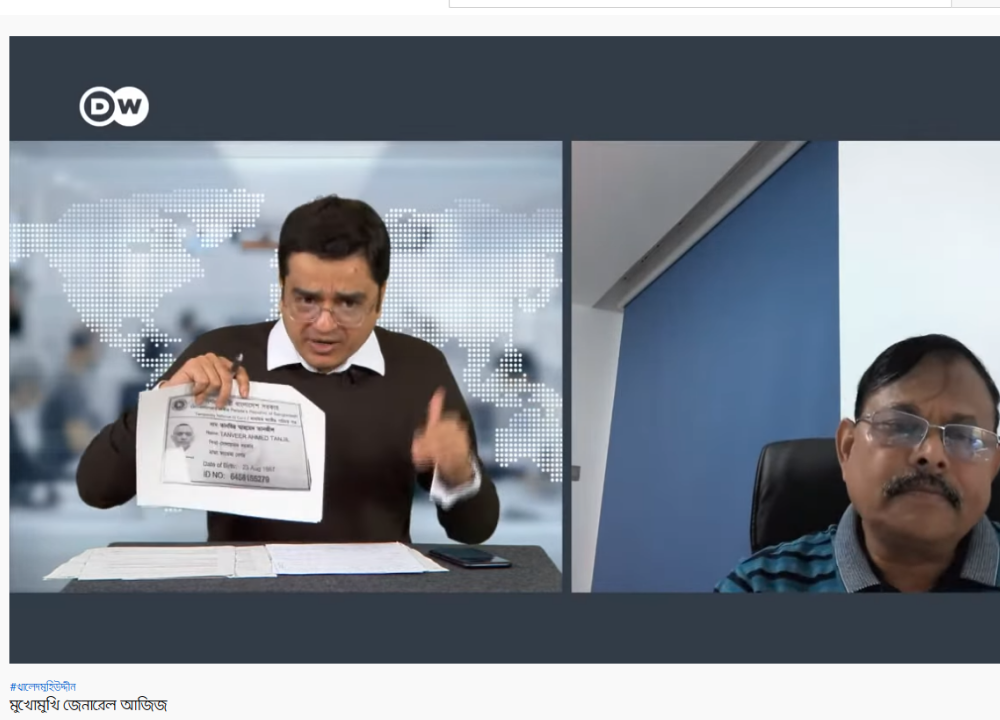Aziz does not deny central allegation in Al Jazeera film
Former Bangladesh army chief acknowledges his brother falsified passport and other documents.

In his first media interview following the broadcast of the Al Jazeera film “All the Prime Minister’s Men”, Bangladesh’s former army chief said that he “could not recall” whether he helped his absconding brother, Haris Ahmed, earlier convicted of murder, with getting fake identification documents, a key allegation in the film.
General Aziz Ahmed, who retired as head of the army in June 2021, told Deutsche Welle host Khaled Muhiuddin on December 24th 2021 in a live interview, “I don’t think so… I don’t know whether something like that happened. I can’t recall whether something like that ever came up.” The fake documents had helped his brother, convicted of murder, to travel out of the country and set up a business in Hungary.
Ahmed did, however, acknowledge that one of his other younger brothers, Tofail Ahmed Joseph, also convicted of the same murder, had obtained false and fake identity documents including two passports.
“Millions of Bangladeshis are abroad — are they all using their actual name, identity, or address?” he said when he was shown screenshots of the false documents that were first published in the Netra News story titled “Gangster returns: Joseph’s new identity”.
Netra News had detailed how Joseph, widely known to have been a violent gangster in Dhaka, was living a new life under a false identity, “Tanveer Ahmed Tanjil”. The story explained that in obtaining the false documents, the former murder convict had potentially violated numerous Bangladeshi criminal laws.
General Ahmed, however, played down the gravity of the offense, claiming, without offering any evidence or statistics, that millions of Bangladeshis live under a false name.
When asked whether he exercised influence on behalf of his brother in obtaining those documents, he did not answer directly. “Give me one example if I telephoned someone or I ordered someone to do it. Do you have any such evidence? Give me proof,” he challenged the host. “There are millions of Bengalis (who are abroad) — what would you say about them?”
The retired general did however deny allegations that he had orchestrated the presidential pardons and remissions awarded to his three brothers, including Joseph, all of whom had been convicted of murder. Citing the previous explanations given by the law minister, Ahmed declined to provide any further detail on that episode.
Ahmed also denied allegations of influence-peddling in the purchase of military or other government contracts. In the Al Jazeera film, one of his formerly absconding brothers, Harris Ahmed, was secretly filmed boasting about how he could obtain the contracts to supply the Bangladesh military with arms and other equipment.
“I challenge if someone could produce any evidence that I — while I was the BGB chief or the army chief — awarded any arms, equipment, ammunition procurement contracts to any of my brothers or relatives, I will accept anything,” the retired general said.
The procurement of the Israeli spyware
In response to the allegation made in the Al Jazeera film that the Bangladesh Army had bought Israeli-origin spyware, a country with which Bangladesh has no formal ties, he reiterated the army’s previous rebuttal that it was purchased as required by the United Nations — a claim the UN denies.
The Al Jazeera film showed how the Bangladesh army purchased an IMSI catcher from a company based in Israel. In its own rebuttal to the film, the army’s public relations office claimed that the surveillance equipment had been bought in response to a UN request.
A UN Department of Peace Operations (DPO) spokesperson, however, had told Netra News, “No agreement was pursued with Bangladesh [to purchase surveillance equipment for UN peacekeeping operations].”
Earlier, the United Nations had issued a statement stating that “the United Nations has not identified a requirement for the capability provided by the operation of electronic equipment of the nature described in the Al Jazeera reporting and such equipment has not been deployed with Bangladeshi contingents in United Nations peacekeeping operations.”
The army chief, however, read out in the live interview from what he said were letters and email communications from the UN to Bangladesh inquiring about the availability of the said equipment.
He also said the purchase had been initiated before he became the chief of army staff.
The cancellation of US visa
The general also spent a considerable amount of time in the interview refuting more recent media reports in Bangladesh about the alleged cancellation of his US visa. The reports emerged in the wake of the US decision to impose unprecedented sanctions and entry restrictions on former and current commanders of the Rapid Action Battalion (RAB), most of whom are deputised from the Bangladesh military.
The story, first carried by the Bangla newspaper Manab Zamin and subsequently corroborated by Prothom Alo and others, claims that US authorities had informed Ahmed about the cancellation of his visa in a letter. But Ahmed says he has not received any such communication and that his visa has not expired.
An editor with Manab Zamin said they stood by their reporting.●